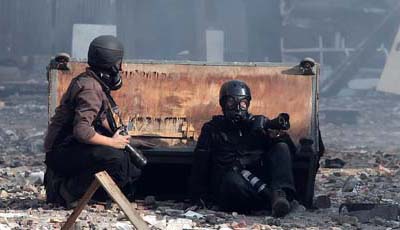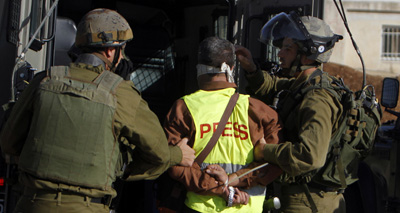Editor charged with defamation in Morocco
New York, January 15, 2013–Authorities should drop the criminal defamation charges against an editor in Morocco who reported that a government official had ordered champagne to his hotel room while on a taxpayer-funded trip outside the country, the Committee to Protect Journalists said today. The official has disputed the account.

Attacks on the Press: From Uprisings, Trends to Watch
The Middle East’s political shifts changed conditions for journalists dramatically. The emerging trends favor free expression, but are filled with ambiguity and depend on the political configurations to emerge after the revolutionary dust has settled. By Mohamed Abdel Dayem
Attacks on the Press in 2011: Morocco
King Mohamed VI pledged a series of constitutional reforms in March after the region’s wave of popular uprisings passed through the kingdom. But the reforms did not extend to opening up the press. Authorities took concerted measures to suppress coverage of mass protests in Casablanca’s streets. During a March protest in the capital, Rabat, uniformed…
Politicized prison sentence for Moroccan editor
New York, June 9, 2011– Today’s one-year prison sentence against Rachid Nini, executive editor of the Moroccan daily Al-Massae and owner of Al-Massae Media Group, is the latest instance of the Moroccan government settling scores with critical journalists through a judiciary that is subservient to the executive branch, the Committee to Protect Journalists said today.
Morocco, Syria detain journalists; violations across region
New York, May 4, 2011–The Committee to Protect Journalists called on Morocco today to release editor Rachid Nini and sought the release of journalist Dorothy Parvaz as well as other journalists in Syria. Press freedom violations continued throughout the region, with abuses in Bahrain, Saudi Arabia, Oman, and Yemen.

Bahrain expels CNN reporter, detains WSJ correspondent
New York, March 17, 2011–Bahraini authorities expelled a CNN reporter and briefly detained another international reporter on Wednesday amid an intensified crackdown on political unrest. The Committee to Protect Journalists condemns the Bahraini government’s ongoing obstruction of news media and calls for authorities to allow journalists to cover this story of international import. Elsewhere in…
Attacks on the Press 2010: Middle East and North Africa Analysis
Suppression Under the Cover of National Security By Mohamed Abdel Dayem Relying on an extensive network of sources in the military, government, and Islamist groups, Yemeni freelance journalist Abdulelah Shaea had become a frequent and pointed critic of the administration’s counterterrorism efforts. By July, President Ali Abdullah Saleh’s government had enough, dispatching security agents to…
Attacks on the Press 2010: Morocco
Top Developments • Government pressures advertisers, uses courts to punish critical media. • Authorities obstruct Spanish and other foreign reporters in Western Sahara. Key Statistic 2: Leading independent weeklies that closed under government pressure. A daily facing harassment moved online. The government continued using the judiciary to settle scores with critical journalists and pressuring private…
